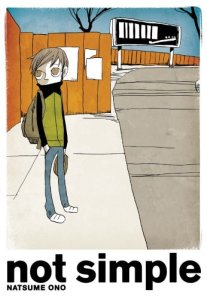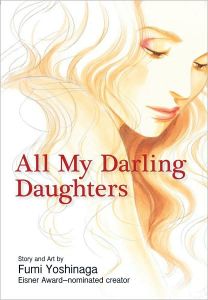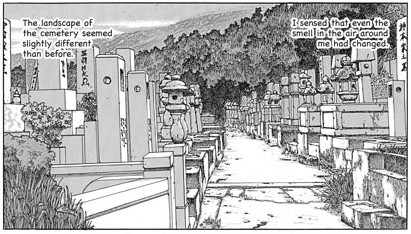Kate (The Manga Critic) Dacey is giving away copies of the new softcover editions of Osamu Tezuka’s Ode to Kirihito (Vertical). All you have to do is name your favorite Tezuka character.
I know it’s not healthy.
Spending too much on comics, then talking too much about them
by David Welsh
Kate (The Manga Critic) Dacey is giving away copies of the new softcover editions of Osamu Tezuka’s Ode to Kirihito (Vertical). All you have to do is name your favorite Tezuka character.
I know it’s not healthy.
by David Welsh
When a creative type is sufficiently prolific, he or she is bound to have highs and lows in his or her body of work. Heck, sometimes results can vary wildly when a creative type just has two major credits in his or her portfolio. Sometimes you may get Leave it to Chance and then Justice League: Cry for Justice, or Imadoki! may sit on the same resume as Absolute Boyfriend.
We ponder this uncomfortable juxtaposition of credits in this installment of “Free to a Good Home,” my intermittent manga give-away contest. Our specific subject is the prolific Natsume Ono, who currently has two works available in print and translation. And let’s just say that opinion has been divided on one of them.
 That would be her family melodrama not simple (Viz). Now, I liked this book quite a bit, and so did some other folks, but critical responses have been undeniably mixed:
That would be her family melodrama not simple (Viz). Now, I liked this book quite a bit, and so did some other folks, but critical responses have been undeniably mixed:
Leroy Derousseaux at Comic Book Bin:
“It is unfortunate that much of not simple reads like one of those somnambulant alt-comix dramas (like Alex Robinson’s Tricked).”
Kate (The Manga Critic) Dacey:
“As a result, not simple reads like a medieval martyr play, a grim catalog of one saintly individual’s bodily and emotional suffering. In a phrase: not recommended.”
Tucker (The Factual Opinion) Stone:
“While it ultimately achieves a bunch of specific objectives—most of them manipulative family horror tricks—it mixes those with a terrible framing story, an unwillingness to portray its main character as anything more than a brainless victim, and a nice chunk of ineptitude when it comes to dealing with its gaping plot holes.”
 On the bright side, Ono’s Ristorante Paradiso (Viz) (which I also liked) has received a somewhat gentler reception:
On the bright side, Ono’s Ristorante Paradiso (Viz) (which I also liked) has received a somewhat gentler reception:
“Ristorante Paradiso has a simple story that provides a basic framework for Ono to showcase her memorable characters and allow them to interact in a way that feels natural and unhurried.”
Kate (The Manga Critic) Dacey:
“Put simply, Ms. Ono, you won my heart back. I found Ristorante Paradiso an engaging story filled with complicated, true-to-life characters who I enjoyed getting to know.”
Sean (A Case Suitable for Treatment) Gaffney:
“This is nothing at all like what’s coming out in the Jump or Beat lines, and pretty much exactly what I want to see from Viz’s Signature line. Manga I had no idea I wanted, but now suddenly want to see more of.”
So here’s the drill: to enter, simply send me an e-mail mentioning two works by the same creative type, one that you liked a lot, one that disappointed you to some significant degree. You don’t need to limit yourself to the comics medium. Novels, movies, plays, TV series, songs, paintings, poems, whatever… if they hinge on the same artistic soul (say, Meryl Streep) and had decidedly mixed outcomes (say, Sophie’s Choice and She-Devil), they are fair game.
You must be 18 or older to enter. I’m perfectly willing to ship internationally, though it will be cheap and it will be slow, so I’m just warning you right now. Deadline for entries is 12 noon Eastern Standard Time Sunday, April 11, 2010, and entries should be sent to DavidPWelsh at Yahoo dot Com. The winner will be chosen at random and receive copies of not simple and Ristorante Paradiso.
Also, if you’re among the Ono early adopters and have a moment and an opinion, please cast your vote in the poll below!
by David Welsh
Congratulations to Michelle (Soliloquy in Blue) Smith on winning a copy of Yumi Unita’s Bunny Drop (Yen Press)! Michelle described her favorite fictional father figure, Captain Kondo from Kaze Hikaru (Viz) thusly:
“He doesn’t have the elite background some of the samurai have, and might be argued to be a simple man, but he’s also an extremely good man with a profound devotion to his cause that inspires incredible loyalty in the men he commands. He was a strong father figure to Okita Soji when he first encountered the little boy, and Okita loves him so deeply that he’s sworn to follow Kondo into death and completely avoids any ties in the world that might prevent him from carrying through his wish. I challenge readers not to love Kondo, too, after they meet him.”
All the entries were great, and they ran a wide range of comic-book dads. Johanna (Comics Worth Reading) Draper Carlson cited Batman as “Grim and remote but reveals deep emotion at key moments.” Gosha Shtashel honored “Louis, father from Three Shadows [First Second] by Cyril Pedrosa, “ adding that the book itself is “the best comic I’ve ever read.”
 Laurianne Uy likes Van Hohenheim from Fullmetal Alchemist (Viz): “For all his talk about being a failure as a father, he managed to raise kids like Ed and Al who are strong, intelligent and morally upright. His absence for most of their lives is horrible but the fact that he feels regret about abandoning is family is still something I can empathize with.” Rijomu Sedai concurs that Hohenheim is kind of cool, but gives full props to FMA’s “Father,” “The big bad, ‘father’ to a bunch of inhuman monsters, not a shred of humanity in him.”
Laurianne Uy likes Van Hohenheim from Fullmetal Alchemist (Viz): “For all his talk about being a failure as a father, he managed to raise kids like Ed and Al who are strong, intelligent and morally upright. His absence for most of their lives is horrible but the fact that he feels regret about abandoning is family is still something I can empathize with.” Rijomu Sedai concurs that Hohenheim is kind of cool, but gives full props to FMA’s “Father,” “The big bad, ‘father’ to a bunch of inhuman monsters, not a shred of humanity in him.”
Sean (Kleefeld on Comics) Kleefeld cited Reed Richards of the Fantastic Four:
“But not the version that zapped his son into a coma back in the ’70s, or the current version who’s just kind of a rat bastard, but the version who actually tried to be a good father and uses his intellect to make life better for his kid. Even if he didn’t always quite ‘get’ the whole how-to-be-a-good-dad thing.”
Eric Rupe likes Yotsuba’s dad, and he’s seconded by Shelly in the comments on the call-for-entries post:
“I love his mix of bewilderment, playfulness, sternness, and above all acceptance and love of his strange daughter. I love how he encourages her to be herself, and how he eggs her on with blank-faced fabrications, and how he’s got a side of real exasperated ‘dad’ in him that we’d all have dealing with a child like her. I think perhaps he reminds me of what I love about my dad.”
 Back in the Marvel universe, Lorena (I ♥ Manga) Nava Ruggero favors Professor X: “I loved X-Men in high school and [he] always seemed like an interesting guardian for all the wayward mutants under his care.”
Back in the Marvel universe, Lorena (I ♥ Manga) Nava Ruggero favors Professor X: “I loved X-Men in high school and [he] always seemed like an interesting guardian for all the wayward mutants under his care.”
2terrible2kiss goes into the realms of unlicensed boys’ love for her picks:
“Y’know, I just love dads in yaoi. I dunno how many you’ve read, but aside from being the ultimate form of ‘man domestication’, there’s actually a lot of variety there too. I think you’d like Nobara by Kumota Haruko (he’s a ball of middle-aged moe. Affectionate but has been abandoned, along with his daughter, by his wife for being gay, he’s just trying to work hard and make a better life for her :D) and Tsubaki Biyori (her dad is so cool-faced, falling easily into his role as responsible parent, even though he’s a bit overwhelmed..since she keeps trying to run off when he’s not looking XD He wants to connect with old friends but acknowledes that he has different priorities now and has to put his daughter first.)“
 Gifted cartoonist Faith Erin Hicks is admirably honest in her nomination:
Gifted cartoonist Faith Erin Hicks is admirably honest in her nomination:
“Okay, just wanted an excuse to talk about Urasawa actually, because I love love love Kenji and Kanna’s relationship in 20th Century Boys. Kenji’s commitment to Kanna proves to me that he’s a hero underneath the loser facade, so he doesn’t need to go off fighting giant robots to prove it. God I’m not going to make it through 24 volumes of this… Seriously, the part where Kanna takes a bowl of udon to the Friends’ monument and wishes an absent Kenji happy birthday… why must you play so with my emotions, Urasawa?”
It’s hard not to find an intriguing family member in Fruits Basket, isn’t it? Shannon Weary cites “the subtly abusive Akira Sohma.
“Even though he is remembered by his daughter, Akito, as her ‘good father’, the reader can see how his seeing her less as a person but more as a label- ‘his special child’, a confirmation that his relationship with her mother was special, has damaged her. Her attempts to hold on to his memory were ultimately damaging- as she couldn’t move forward being obsessed with his belief that no one would leave her.
“Of course, perhaps this was due to his own fear of death, and loneliness. Since he’s a character that others talk about, but never speaks on his own, the reader can only conjecture, but told he was going to die young, he seems to fear dying alone. He begins a codependent relationship, which warns the readers of the pitfalls of the obsessive focus of love that is often pushed in manga.”
Back in the aforementioned comments thread, Matthew (Warren Peace Sings the Blues) Brady looked to Ogami Itto from Lone Wolf and Cub (Dark Horse): “Probably not the best father, but quite possibly the awesomest.”
 Margaret cited Kippei Katakura in Yoko Maki’s Aishiteruze Baby (Viz).
Margaret cited Kippei Katakura in Yoko Maki’s Aishiteruze Baby (Viz).
“Kippei is a seventeen-year-old high school playboy who is suddenly saddled with the role of ‘Mr. Mom’-style chief caregiver when his recently-widowed aunt simply takes off, leaving her five-year-old daughter Yuzuyu behind. The Katakuras, who have apparently never met the child before, reluctantly decide to take her in, and Kippei’s bossy older sister assigns him to take care of the kid because a) ‘you’re sweet to girls’ and b) she hopes Kippei’s having to babysit a five-year-old will have a dampening effect on his frenetic social life and tendency to attract annoying female stalkers to the house.
“This arrangement actually works out surprisingly well. Although Kippei is initially less than thrilled to be handed such a major responsibility, he likes Yuzu, and his easygoing charm enables him to bond with her almost immediately. But good intentions aren’t enough. The previously undomesticated boy quickly realizes that half-measures like hastily buying his little cousin a pre-packaged lunch at a convenience store on the way to kindergarten can have traumatic consequences in a milieu where bringing in an amateurish or non-homemade bento is perceived as a symptom of a shamefully inadequate family. Various comical and touching misadventures in lunchmaking ensue, ranging from Kippei’s well-intentioned maiden effort of a single ridiculously oversized riceball to his awkward attempt to research what little girls like to eat for lunch by consulting his secret crush Kokoro and her friends.”
Thanks to everyone who entered!
by David Welsh
 You’ve probably already noticed this, but I can be a little scattered. This quality can result in me winding up with more than one copy of the same comic. For instance, in a burst of josei boosterism, I grabbed a copy of Yumi Unita’s Bunny Drop (Yen Press) over the weekend, completely forgetting that I’d pre-ordered it through the comic shop. But you can profit from my absent-mindedness, as I’m giving away the unread extra.
You’ve probably already noticed this, but I can be a little scattered. This quality can result in me winding up with more than one copy of the same comic. For instance, in a burst of josei boosterism, I grabbed a copy of Yumi Unita’s Bunny Drop (Yen Press) over the weekend, completely forgetting that I’d pre-ordered it through the comic shop. But you can profit from my absent-mindedness, as I’m giving away the unread extra.
You know what I think of the book, but a second opinion is always useful, so here’s Deb (About.Com) Aoki’s take:
“Bunny Drop could have been saccharine or silly – but instead, Unita gives readers a heartfelt, thoughtful and endearing slice-of-life story that will ring true for anyone who has ever loved or cared for a child.”
The last time I did one of these giveaways, I focused on fictional moms. This time around, we’ll concentrate on the father figures.
To enter, simply send me an email at DavidPWelsh at Yahoo dot Com that mentions your favorite comics father or father figure. Now, “favorite” need not necessarily mean “nice.” If there’s a perfectly dreadful father, grandfather, or male guardian that warms the cockles of your heart, he’s fair game. And by “comics,” I’m not limiting you to narrative comics from Japan. If the dad is drawn, he’s eligible, so that includes comic strips, comic books, graphic novels, and so on, from whatever country or time period you choose. If you already have a copy of Bunny Drop but still want to sing the praises of a compelling comics father figure, please feel free to do so in the comments.
Deadline for entries will be at 12 noon Eastern Standard Time Sunday, March 21, 2010. You must be 18 years of age or older to enter.
by David Welsh
 I just wanted to officially note that I’ve forgiven Ayako for not being Princess Knight. ICv2 has an article on Vertical’s Fall 2010 release of Osamu Tezuka’s tale of “a formerly powerful family of landowners who find themselves caught up in the political, social, and economic changes in post-World War II Japan.” It’s been published in French by Manga Delcourt/Akata.
I just wanted to officially note that I’ve forgiven Ayako for not being Princess Knight. ICv2 has an article on Vertical’s Fall 2010 release of Osamu Tezuka’s tale of “a formerly powerful family of landowners who find themselves caught up in the political, social, and economic changes in post-World War II Japan.” It’s been published in French by Manga Delcourt/Akata.
And since I’m nerd-interested in these kinds of things, I’ll note that Ayako was originally serialized in Shogakukan’s Big Comic from early 1972 to mid-1973 and was collected in three volumes. Big Comic has been home to a lot of Tezuka manga, including Ode to Kirihito (Vertical), MW (Vertical), and Swallowing the Earth (DMP). Other Tezuka-Big Comic titles included Gringo, which was a runner-up for this year’s Prix Asie award.
Speaking of Tezuka, I’ll remind you that Kate (The Manga Critic) Dacey is giving away copies of the deeply crazy MW, and I’ll note that Vertical will be releasing Ode to Kirihito in two paperback volumes at the end of this month.
by David Welsh
An interesting mix of books will be arriving at comic shops this week.
First and foremost is Vertical’s soft-cover version of Osamu Tezuka’s MW. This is one of my favorite comics by Tezuka, as you could probably guess from my really long discussion of it with Tom Spurgeon. Kate (The Manga Critic) Dacey is giving away four copies of the book, and she takes the opportunity to revisit her review.
 Staying with the classics, CMX releases the 15th volume of Kyoko Ariyoshi’s peerless ballet drama, Swan. In a weird coincidence, I’ve also written about this one at length.
Staying with the classics, CMX releases the 15th volume of Kyoko Ariyoshi’s peerless ballet drama, Swan. In a weird coincidence, I’ve also written about this one at length.
Underground (Image), a nifty mini-series written by Jeff Parker and illustrated by Steve Lieber with colors by Ron Chan, concludes with its fifth issue. I can’t seem to find a cover image, but you can go visit the title’s site and see some sample pages. I’ve enjoyed this cave-bound tale of rangers versus no-good developers quite a bit.
Marvel gathers a whole lot of talent for its three-issue Girl Comics mini-series, which debuts Wednesday. It’s got a kind of unfortunate name, but what’s new about that? The participation of Colleen Coover will probably meet the price of admission, at least for me. You can take a look at several preview pages over at Comics Alliance.
 Or you could just dump all of your comics budget on new volumes of Eiichiro Oda’s One Piece from Viz, specifically the 34th, 35th, 36th, 37th, and 38th. I won’t lie; I’d almost entirely support that decision, because I’ve developed a seriously unhealthy addiction to this tale of dimwitted pirates and the out-there friends and foes they meet as they pursue big dreams.
Or you could just dump all of your comics budget on new volumes of Eiichiro Oda’s One Piece from Viz, specifically the 34th, 35th, 36th, 37th, and 38th. I won’t lie; I’d almost entirely support that decision, because I’ve developed a seriously unhealthy addiction to this tale of dimwitted pirates and the out-there friends and foes they meet as they pursue big dreams.
 But if you did that, you’d be denying yourself the pleasure of the ninth volume of Chica Umino’s Honey and Clover, so my support for an Oda-centric purchasing strategy must be at least partly qualified. And really, after five volumes of nutty high-seas adventure, won’t it feel nice to decompress with some quirky, art-school drama?
But if you did that, you’d be denying yourself the pleasure of the ninth volume of Chica Umino’s Honey and Clover, so my support for an Oda-centric purchasing strategy must be at least partly qualified. And really, after five volumes of nutty high-seas adventure, won’t it feel nice to decompress with some quirky, art-school drama?
by David Welsh
Congratulations to Ahavah for winning a copy of Fumi Yoshinaga’s All My Darling Daughters (Viz)! I asked entrants to name their favorite comic mom (by which I mean mothers or mother figures from comic books, graphic novels or comic strips as opposed to moms that are laugh riots, though they could also be that). Here’s Ahavah’s choice:
“My favorite manga mom is Kyoko Honda from Fruits Basket, but not just because of the sweet-as-sacharine way she brought up Tohru before her untimely death…
“Kyoko Honda embodies a great message for girls: Tough chicks can be devoted mothers and never lose their strength. If you’re lucky enough to find one as your mentor, hold on to them, because they know the worst of life’s crapile and can help you figure out how to turn it all to your advantage.”
Other noteworthy moms mentioned by entrants include:
Thanks to everyone who entered!
by David Welsh
 Have you been meaning to sample the work of Fumi Yoshinaga but don’t know where to start? Here’s your chance to win a copy of Yoshinaga’s All My Darling Daughters (Viz), which has garnered more than a little critical praise since its release:
Have you been meaning to sample the work of Fumi Yoshinaga but don’t know where to start? Here’s your chance to win a copy of Yoshinaga’s All My Darling Daughters (Viz), which has garnered more than a little critical praise since its release:
“The storytelling style and the stories themselves all echo familiar manga tropes, but in Yoshinaga’s hands they have grown up and become something rich and strange—and highly entertaining.” Brigid Alverson, MangaBlog
“In addition to all of this thoughtful, integrated writing, Yoshinaga also employs her distinctive artistic style in the service of the story.” Michelle Smith, Manga Recon
“At times haunting, and at times very sweet, this book isn’t easily classifiable. It even has some occasional humor, and I love Yoshinaga occasionally slipping into caricature when she’s drawing Yukiko’s snarling face.” Sean Gaffney, A Case Suitable for Treatment
“And while I enjoyed Ooku and Antique Bakery, I think that All My Darling Daughters is my favorite comic from Yoshinaga to date.” Greg McElhatton, Read About Comics
“With this book, Yoshinaga really focused on a group of people, digging into their motivations and examining their relationships with one another.” Dave Ferraro, Comics-and-More
“Reading it can sometimes be like watching a soapy drama on television (Lifetime, anyone?). However, Yoshinaga is a master of insight, familial relationships, and human behavior, and this insight in behavior gives this book a poignant ending that makes the volume worth reading.” Leroy Douresseaux, Comic Book Bin
“It’s unusual to see family and relationship conflicts of this type in comics, especially portrayed in such a raw fashion with such insight. There are plenty of father/son struggles (especially in American comics), but few that tackle the frustrations and unique constraints of being a mature woman.” Johanna Draper Carlson, Manga Worth Reading
And here’s my review.
To enter, simply send me an email at DavidPWelsh at Yahoo dot Com that mentions your favorite comics mother or mother figure. By “favorite,” I don’t automatically mean the character that fills you with greeting card feelings, and if your tastes run more in the direction of Medea than I Remember Mama, that’s absolutely fine. If you already have a copy of All My Darling Daughters but still want to sing the praises of a compelling comics mom or grandmother, please feel free to do so in the comments.
Deadline for entries will be at 11:59 p.m. Eastern Standard Time Saturday, Feb. 6, 2010. You must be 18 years of age or older to enter.
by David Welsh

In an high-security drawing witnessed by my dogs, Francene Lewis was chosen as the winner of the first volume of Jiro Taniguchi’s A Distant Neighborhood. Congratulations, Francene, and thanks to everyone who entered.
Just for the record, I would probably go back to my senior year in high school, armed with the knowledge of who came out of the closet later. I would also use the timing to reconsider my choice of colleges, opting for something larger and more urban with a major in Japanese. Yes, I would relive my life based on boys and manga. I would also probably floss more often.
by David Welsh

Time’s running out to enter to win a copy of the first volume of Jiro Taniguchi’s A Distant Neighborhood (Fanfare/Ponent Mon). Click here for details.